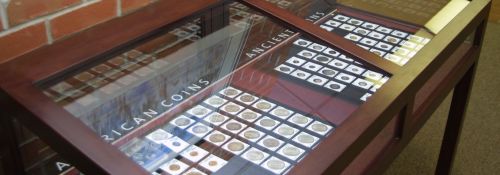
The Carus Coin Collection
Written by Dr. Kenneth Calvert
The history of money is complicated due to the fact that anything two people consider valuable might be considered money. When a community deems something of value, it will be traded for goods and services needed or wanted by the members of that community. Bitcoins have become valuable as an electronic form of money as have local currencies such as the Brixton pound in South London. In fact, every era of human history includes some sort of commodity deemed useful for trade. In early human cultures it was grain, or farming tools, or lumps of precious metals (weighed using agricultural measures such as the “shekel”) which served as money. As civilizations became more complex, cities and states began to hold reserves of precious metals and to use pieces of these metals to pay military expenses, construction costs, debts, and to give gifts. It is important to recall that ancient economies – particularly land, animals, and precious metals – were most often controlled by landed elites.
Among the ancients were the Greeks, who first introduced what we recognize as coins. The ability of Greek city-states and their citizens to create new wealth allowed for an intellectual, political, artistic, literary, and scientific explosion among those city-states that literally transformed world history. And just as that “Greek miracle” opened doors among the Greeks, so have they today made it possible for everyday people in the modern world to better their lives, those of their local communities, and of their nations. Among the ancient Romans, the availability of money in the economic activities of everyday citizens played a vital role in the life of the Republic. In Rome it was at the temple of Juno Moneta (Juno of the Arx on the Capitoline Hill) that coins were minted; hence, our word “money.” Our modern world has been defined by the genius of Greek democracy and Roman republicanism as well as by the practice of free trade, which is inseparable from political freedom. The study of money has shown us that when either political or economic freedom is threatened, both are threatened. When both are ensured, both flourish.
In 2006, Hillsdale College received thousands of ancient and modern coins from Mr. Alwin Carus of LaSalle, Illinois. Before he passed, Mr. Carus shared with me his wish that his coins be used in the classrooms of both Hillsdale College and Hillsdale Academy (the college’s private, classical K-12 school). Over the past nine years, our faculty members have used this collection in courses ranging from history and classics to art and economics. These coins serve to remind us of the important role that money has played in the rise of complex civilizations on every continent. Humanity has risen from the traditions of the old, landed aristocracy to the vast array of possibilities afforded people who, due in great part to the invention of coins, have found it possible to pursue their dreams and aspirations. When free and open means of exchange exist in every culture and on every continent, then the arts, education, and quality of life improve dramatically.
In modern times a positive perspective on money has been under severe attack, particularly from those espousing Marxist ideologies. However, even in communist states, where an elite oligarchic group controls the economy and land, black markets forever emerge among human beings who seek to improve their lives regardless of state powers. To pursue a freedom of exchange is to pursue an improvement in the standard of living for all people, not just some. Margaret Thatcher once said, “No one would remember the Good Samaritan if he’d only had good intentions; he had money as well.” Rather than everyone having an opportunity to be poor, as is the result of “progressive” economic theory, the history of money has shown us that when people are free to pursue wealth, everyone benefits – even (perhaps especially) those who are in need of assistance. Hillsdale College and Hillsdale Academy are grateful to Alwin Carus for his gift of coins and for the many lessons we are able to teach through this money.
Dr. Kenneth R. Calvert is the Associate Professor of History and Hillsdale Academy Headmaster.